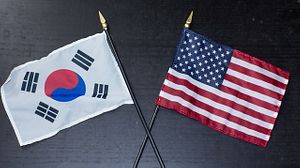South Korea agreed on initiating amendment negotiations for the United States–Repubic of Korea Free Trade Agreement (US-ROK FTA or KORUS FTA) this week amid pressures from the United States to terminate the agreement altogether.
On September 4, at the second special session of the US-ROK FTA Joint Commission held in Washington D.C., South Korea’s Ministry of Trade, Industry, and Energy met with the United States Trade Representative (USTR) and agreed on the “need to amend the agreement.”
This came as a surprise to the South Korean public since the government had long stood against making any changes to the agreement. As recently as August 22, South Korean trade representatives had made it clear at the first special session of the Joint Commission that they intend to “look first into the economic effects of the agreement” before talking about making any revisions.
Many sources suggest that South Korea’s abrupt switch-over decision to revise the agreement was a result of U.S President Donald Trump’s “madman strategy.” While Trump has been outspoken against the agreement since the start of his presidential campaign, he has been applying stronger pressure on South Korea by “cultivating an image of recklessness.” On October 2, Trump allegedly told the USTR Robert Lighthizer that “if they don’t give the concessions now, this crazy guy will pull out of the deal” as an attempt to scare the South Korean negotiators.
As a response to the United States’ aggressive stance, Kim Hyun-joong, South Korea’s chief negotiator for the agreement, stated on September 27 at a press conference in Washington that “how the United States is threatening to terminate the US-ROK Free Trade Agreement is more than just a bluff. We have determined that it is a substantial threat which can be realized at any moment in the future.” It was a toned-down gesture to say that South Korea is ready to make a compromise and consider a possible amendment.
Based on this week’s agreement, both the United States and South Korea will be going through respective internal procedures before making a formal declaration to begin amendment negotiations. For South Korea, it will first conduct an economic assessment, public hearing, and report to the National Assembly before declaring the start of negotiations. The United States administration will report to Congress 90 days before the negotiations take place. The negotiations may start as soon as early next year.
Many expect that the amendment process will include strong U.S. pressure to abolish tariff on certain sensitive goods. At the first special session of the Joint Commission, the United States called for an immediate abolishment of tariff on its own agricultural products, which went directly against the South Korean government’s stance of never allowing any concession on agricultural goods including rice. However, the pressure is unavoidable as Washington is using recent tariff abolishment on its own automobiles and steel as a momentum to infiltrate the agricultural sector.
Even if they fail to do so, it is expected that the United States will request further concessions in the service sector which it has already been enjoying substantial profit, or open up newly emerging industries that were not discussed at the time the agreement was originally concluded.
For South Korea, experts are proposing to use this opportunity to amend provisions related to the Investor-State Dispute Settlement (ISDS), a system that requires to bring any dispute arising from international trade agreements to be brought to international mediation agencies, that were subject to criticisms that it “infringes upon South Korea’s judicial sovereignty.”
The current US-ROK Free Trade Agreement was concluded on April 14, 2012. South Korea is the United States’ sixth largest trading partner.

































